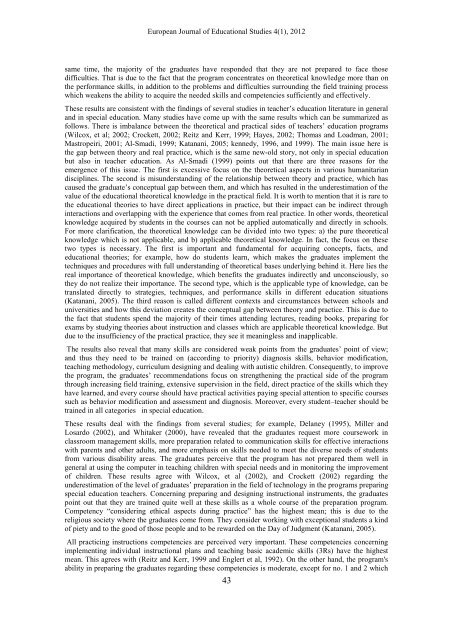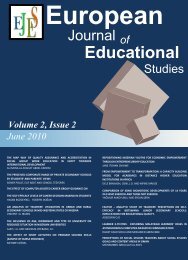Volume 4 Issue 1 (February 2012) - Ozean Publications
Volume 4 Issue 1 (February 2012) - Ozean Publications
Volume 4 Issue 1 (February 2012) - Ozean Publications
You also want an ePaper? Increase the reach of your titles
YUMPU automatically turns print PDFs into web optimized ePapers that Google loves.
European Journal of Educational Studies 4(1), <strong>2012</strong><br />
same time, the majority of the graduates have responded that they are not prepared to face those<br />
difficulties. That is due to the fact that the program concentrates on theoretical knowledge more than on<br />
the performance skills, in addition to the problems and difficulties surrounding the field training process<br />
which weakens the ability to acquire the needed skills and competencies sufficiently and effectively.<br />
These results are consistent with the findings of several studies in teacher’s education literature in general<br />
and in special education. Many studies have come up with the same results which can be summarized as<br />
follows. There is imbalance between the theoretical and practical sides of teachers’ education programs<br />
(Wilcox, et al; 2002; Crockett, 2002; Reitz and Kerr, 1999; Hayes, 2002; Thomas and Loadman, 2001;<br />
Mastropeiri, 2001; Al-Smadi, 1999; Katanani, 2005; kennedy, 1996, and 1999). The main issue here is<br />
the gap between theory and real practice, which is the same new-old story, not only in special education<br />
but also in teacher education. As Al-Smadi (1999) points out that there are three reasons for the<br />
emergence of this issue. The first is excessive focus on the theoretical aspects in various humanitarian<br />
disciplines. The second is misunderstanding of the relationship between theory and practice, which has<br />
caused the graduate’s conceptual gap between them, and which has resulted in the underestimation of the<br />
value of the educational theoretical knowledge in the practical field. It is worth to mention that it is rare to<br />
the educational theories to have direct applications in practice, but their impact can be indirect through<br />
interactions and overlapping with the experience that comes from real practice. In other words, theoretical<br />
knowledge acquired by students in the courses can not be applied automatically and directly in schools.<br />
For more clarification, the theoretical knowledge can be divided into two types: a) the pure theoretical<br />
knowledge which is not applicable, and b) applicable theoretical knowledge. In fact, the focus on these<br />
two types is necessary. The first is important and fundamental for acquiring concepts, facts, and<br />
educational theories; for example, how do students learn, which makes the graduates implement the<br />
techniques and procedures with full understanding of theoretical bases underlying behind it. Here lies the<br />
real importance of theoretical knowledge, which benefits the graduates indirectly and unconsciously, so<br />
they do not realize their importance. The second type, which is the applicable type of knowledge, can be<br />
translated directly to strategies, techniques, and performance skills in different education situations<br />
(Katanani, 2005). The third reason is called different contexts and circumstances between schools and<br />
universities and how this deviation creates the conceptual gap between theory and practice. This is due to<br />
the fact that students spend the majority of their times attending lectures, reading books, preparing for<br />
exams by studying theories about instruction and classes which are applicable theoretical knowledge. But<br />
due to the insufficiency of the practical practice, they see it meaningless and inapplicable.<br />
The results also reveal that many skills are considered weak points from the graduates’ point of view;<br />
and thus they need to be trained on (according to priority) diagnosis skills, behavior modification,<br />
teaching methodology, curriculum designing and dealing with autistic children. Consequently, to improve<br />
the program, the graduates’ recommendations focus on strengthening the practical side of the program<br />
through increasing field training, extensive supervision in the field, direct practice of the skills which they<br />
have learned, and every course should have practical activities paying special attention to specific courses<br />
such as behavior modification and assessment and diagnosis. Moreover, every student–teacher should be<br />
trained in all categories in special education.<br />
These results deal with the findings from several studies; for example, Delaney (1995), Miller and<br />
Losardo (2002), and Whitaker (2000), have revealed that the graduates request more coursework in<br />
classroom management skills, more preparation related to communication skills for effective interactions<br />
with parents and other adults, and more emphasis on skills needed to meet the diverse needs of students<br />
from various disability areas. The graduates perceive that the program has not prepared them well in<br />
general at using the computer in teaching children with special needs and in monitoring the improvement<br />
of children. These results agree with Wilcox, et al (2002), and Crockett (2002) regarding the<br />
underestimation of the level of graduates’ preparation in the field of technology in the programs preparing<br />
special education teachers. Concerning preparing and designing instructional instruments, the graduates<br />
point out that they are trained quite well at these skills as a whole course of the preparation program.<br />
Competency “considering ethical aspects during practice” has the highest mean; this is due to the<br />
religious society where the graduates come from. They consider working with exceptional students a kind<br />
of piety and to the good of those people and to be rewarded on the Day of Judgment (Katanani, 2005).<br />
All practicing instructions competencies are perceived very important. These competencies concerning<br />
implementing individual instructional plans and teaching basic academic skills (3Rs) have the highest<br />
mean. This agrees with (Reitz and Kerr, 1999 and Englert et al, 1992). On the other hand, the program's<br />
ability in preparing the graduates regarding these competencies is moderate, except for no. 1 and 2 which<br />
43

















